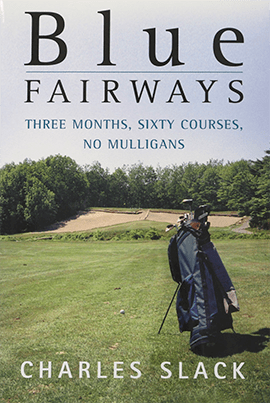Blue Fairways

A golfing everyman throws his clubs in the trunk of his car and starts on a pilgrimage down Route 1, playing public courses all along the East Coast of the United States. Slack introduces a new set of partners with each round and opens a window into a new locale. Traveling from the potato fields of northern Maine to the worn-down urban centers of the Northeast corridor to the sun-drenched havens of the South, Slack chronicles the best and the worst of the public golf experience. Here in the land of new beginnings, he lives out every golfer’s fantasy: a fresh start and a pristine fairway each and every morning. It is a captivating and humorous tale of a quintessentially American journey.
Reminiscent of John McPhee, the author brings to life the areas . . . and the residents. Most entertaining is his openness in exposing the highs and the lows of his game, making us believe—and wish—we were tagging along.
— Golf magazine (four stars).
Blue Fairways will have you laughing out loud in identification, envy and delight.
— Travel & Leisure Golf
More than just one man’s account of a golfing junket, this is an absorbing tale about America.
— Library Journal
United States Golf Association International Book Award finalist
The idea had first come to me one summer evening about a year earlier as I drove home after a round of golf near my home in Richmond, Virginia. Some great old rock song, “Mony, Mony” or Louie, Louie,” something like that, blared from the radio. A fresh breeze rushed through my opened windows. I had played well, well enough, that is, to be thinking about the next time I could golf instead of throwing my golf clubs into the nearest body of water. A thought popped into my head. What if I just kept driving? What if I extended this sublime moment, and, instead of going home to prepare for another work week, I just kept driving, with my only destination being the next golf course down the line?
I stowed the idea with the thousand other harmless fantasies of the sort that get you through your chicken salad on wheat toast at the lunch place around the corner from the office. But over the next several months, this particular fantasy returned at odd times, such as the middle of the night or the middle of some phone call at work. Unlike, say, the fantasy involving the copra schooner and forgotten coral atolls in the South Seas, this one seemed just doable enough to unsettle me. Finally, I broached the subject with Barbara, my wife, assuming (hoping?) that her incredulous reaction would jolt me into forgetting about the idea. Surprisingly, she seemed positive, after raising a few basic questions, such as how would we pay the mortgage and feed ourselves and our daughter. Women are so practical.
Perhaps Barbara sensed, as I did, that I had reached a point in my career and my life that demanded some sort of action, or at least an elaborate gesture. At thirty-five, I had been reporting for the same newspaper in Richmond for a decade, first as a general assignment feature writer, then as a reporter on the transportation beat. I had arrived at the paper in 1986 as an eager twenty-five-year-old cub. Richmond was going to be a two-year stop. Then we’d move to Boston, Washington, New York. But somehow the years slipped by. We bought a house, had a daughter, started worrying about taxes and school districts. Roots sprouted despite out stubborn protestations that we’d be moving on at any moment. I was no longer the youth of twenty-five. I had morphed into a veteran, a reliable pro, a solid member of the team — all those double-edged plaudits guaranteed to fuel the quiet desperation Thoreau wrote about.
Public courses are where the vast majority of America’s twenty million golfers do their stuff. To most golfers the great private courses are more legendary than real, wrapped in layers of mystery, like the rites of a secret society. Public golf courses are open and, by and large, unpretentious. They lay themselves out for public inspection, flaws and all. In return they are endlessly forgiving of a golfer’s flaws. To borrow from Robert Frost’s definition of home, a public course is a place where, if you have to play there, they have to let you play.
